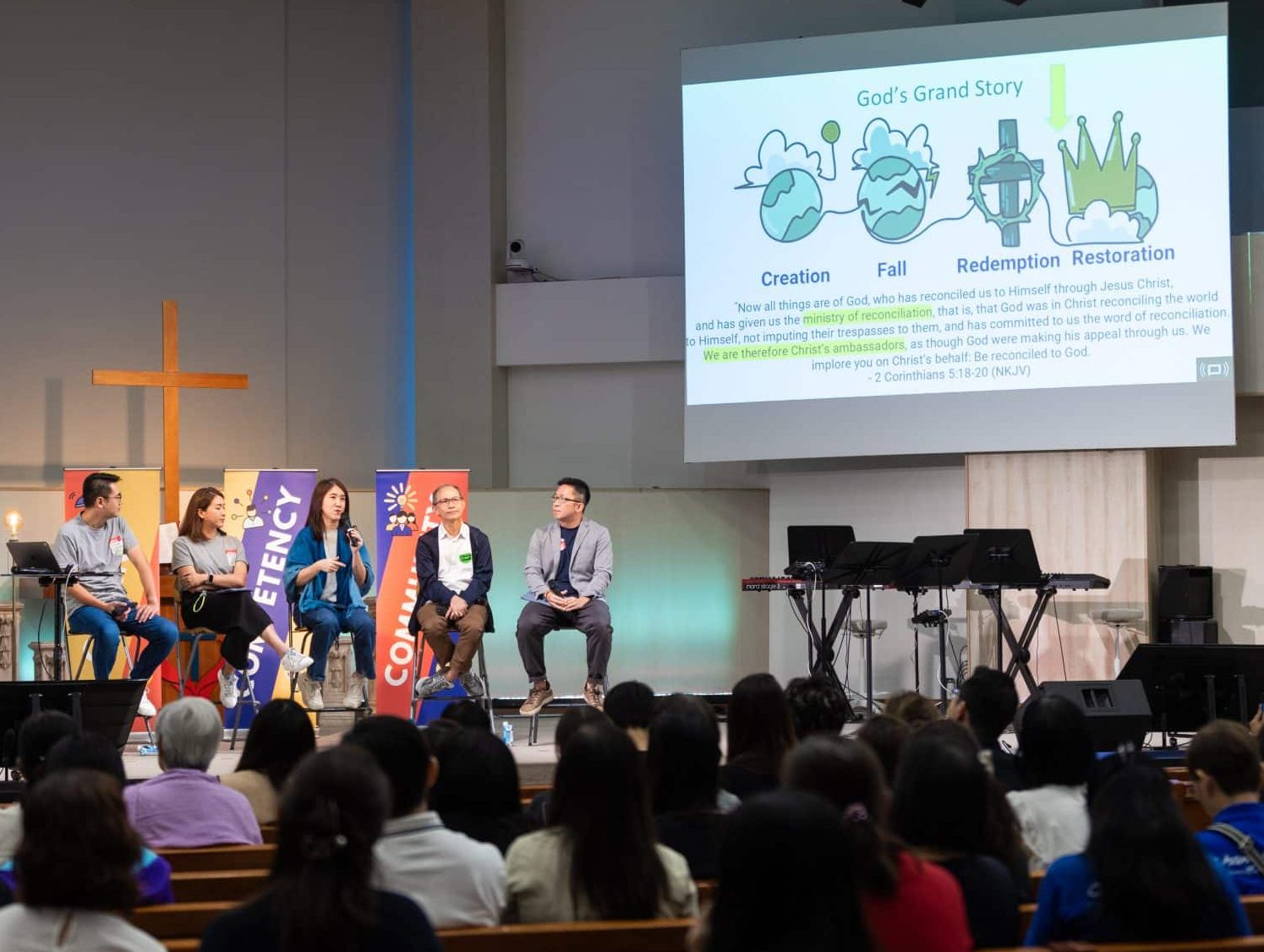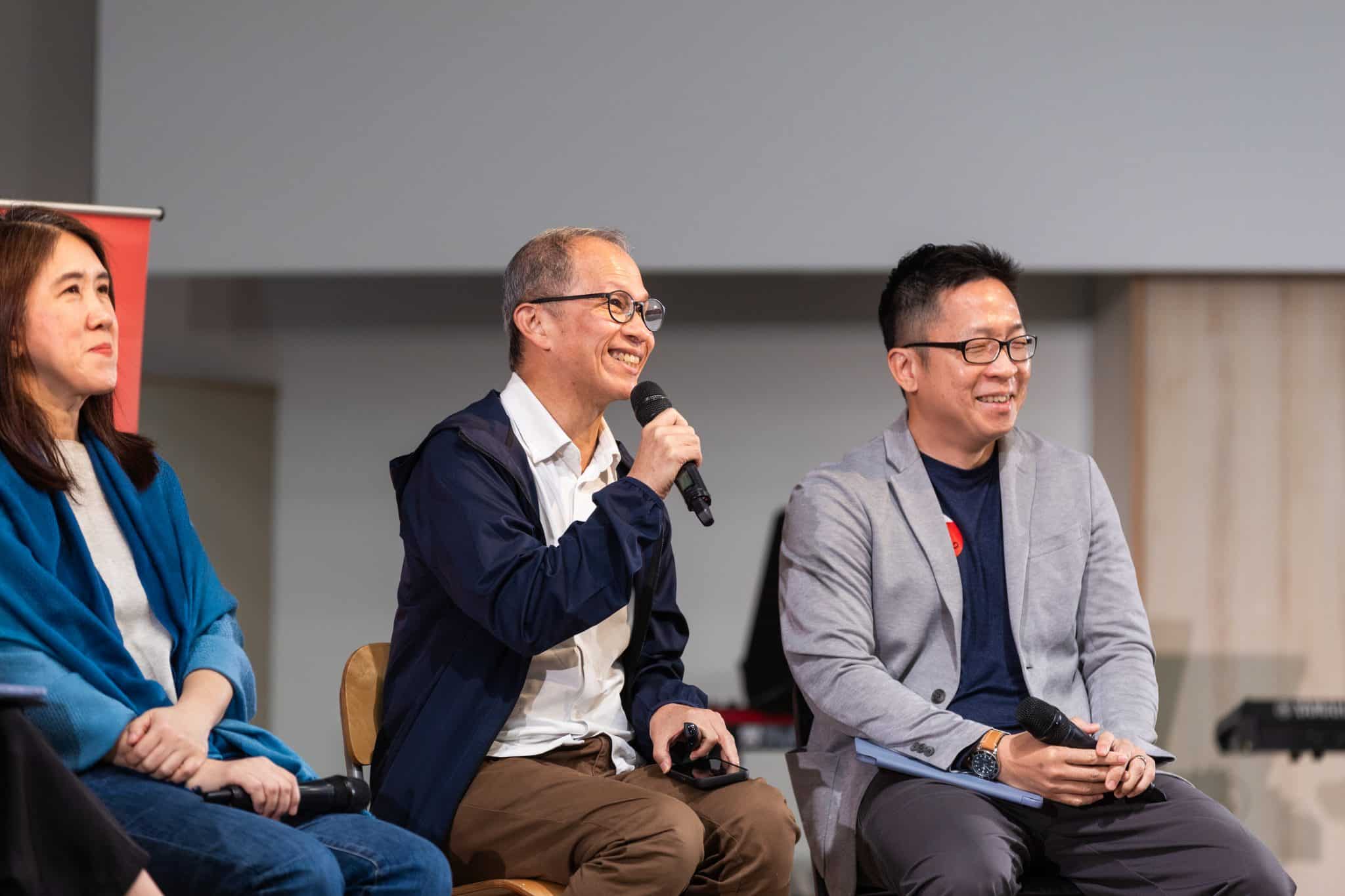What do we need to do in our churches to engage Gen Alpha? We share tips from KidminSG’s panel
by Gracia Chiang // February 18, 2025, 11:43 am

To all serving in children's ministry: How can we win the hearts and minds of Generation Alpha? Photo from Depositphotos.com.
“Tech-savvy”, “curious” and “creative”.
These were just some of the words that were used to describe Generation Alpha during a recent Kidmin Singapore event.
Generally referring to those born from 2010 to 2025, these children of millennials (and some Gen Zs) are the first generation to grow up fully immersed in the digital ecosystem since birth.
“They are growing up at a unique moment in history because they are surrounded by rapid technological advancements, where AI, social media and digital learning are everyday realities,” described Esther Foong, co-founder of KidminSG.
But having technology at their fingertips poses unique challenges too.
“Children as young as 10 to 12 are actually already grappling with the meaning of life.”
“They will also be struggling with different things like screen dependency, shorter attention spans and rising mental health concerns,” discerned Elvin Foong, co-founder of KidminSG.
So what does this mean for those who are looking to disciple and reach out to Gen Alpha?
Here are the highlights from KidminSG‘s first workshop of the year, which was held at Ang Mo Kio Methodist Church on January 18, 2025.
1. Understand the culture they’re living in
“When we’re talking about teaching Gen Alpha, we must first understand the cultural landscape shaping them and how, in turn, they are also shaping culture,” said Esther.
To them, online platforms have become more than just sources of entertainment.

“These platforms are environments where they learn, form relationships and develop their sense of self,” shared Elvin. All event photos by Joshua Pwee.
The digital-first world influences Gen Alpha in at least three major ways, summarised Esther and Elvin.
Immediacy and fragmentation: Social media thrives on short, emotionally stimulating content, training Gen Alpha to prioritise quick, entertaining experiences over sustained, reflective thinking.
Consumerism and identity: Influencer culture and targeted advertising encourage Gen Alpha to tie their identity to their consumption. Products then become a pathway to belonging and validation.
FOMO and virality: The fear of missing out drives them to stay connected and chase fleeting trends. For example, if they do not sing a popular song such as APT, their friends may have a different perspective of them.
Their media habits are also “redefining education, work and even some of our faith practices”, said Esther.
For instance, learning in schools has been gamified using tools such as Kahoot. Even in church, children’s ministry is evolving.
“Nowadays you cannot just say, ‘Sit down, listen, I’m going to teach you, and after that you regurgitate to me,'” observed Elvin.
“Gen Alpha doesn’t exist in a cultural bubble right? They exist within the larger culture that you and I are also a part of,” he said.
“So what they do influences what we do.”
2. Help them develop a Christian worldview
“A worldview is a way of seeing all of reality. Everyone has a worldview,” said digital wellness educator and family coach Carol Loi.
“Just because the children come to church does not mean they have a Christian worldview. Even Christians can hold a very worldly worldview.”
Explaining why inculcating a Christian worldview is so important, she emphasised that “it can provide a map for the complex world that our children are growing up in”.

“The world is so complex, like a 1,000-piece puzzle. But there’s a way, a strategy out of the complexity,” said Carol, who is also a Colson Fellow with the Colson Center for Christian Worldview.
The following five areas are the like the edges of the puzzle, she added.
Once we can help children to answer these big questions, the smaller questions in life are more easily solved.
- Origin: Where did everything come from?
- Identity: Who am I?
- Meaning: Why am I here?
- Morality: How should I live my life?
- Destiny: What happens when I die?
“Children as young as 10 to 12 are actually already grappling with the meaning of life,” noted Carol, sharing from her work with tweens and teens.
How do I view school? What kind of career should I choose? How do I use technology?
Answers to questions like these will fall into place when one has a Christian worldview, she said.
Pointing out that we can also help children to understand that they are on an adventure with God, Carol shared that guiding them to see that they are part of a larger narrative gives meaning and purpose to their lives.

The theme of God’s grand story is restoration, said Carol. “We are all called to reconcile.”
Teaching Gen Alpha about a Christian worldview can be beneficial in other ways too.
“When we are able to understand our role in God’s story, we are better able to defend (our faith). Through that, we can evangelise and bring hope because there is a more beautiful way,” said Carol.
“There is so much goodness in God’s design, and it becomes very natural for us to be able to show through our lives the goodness and beauty of God’s creation.”
With Gen Alpha spending so much time online, they may be consuming a lot of ideas that are not in line with the Bible. This is where teaching discernment is also necessary.
“How do we create an environment that helps them to practise thinking, which includes slowing down?” she asked.
“Once in awhile, it’s okay to have silence and solitude,” suggested Carol, adding that it is good to give children the opportunities to hear the Holy Spirit’s prompting.
“Having that balance is useful.”
3. Make learning interactive
Don’t default to the default.
Sharing this piece of advice with children’s ministry practitioners, Dr Calvin Chong, Professor of Practical Theology at Singapore Bible College, said that this is also what he tells the students in his education class.
If you have a kid who is being disruptive in class, could it be because they are really bored?
“The world that they live in is super interactive,” he said.
But when we “power them down” and expect them to listen to us while teaching in traditional ways, that may be where the problem lies.
“The learning sciences always tells you that interactivity does promote learning,” highlighted Dr Calvin.

“Think out of the box,” challenged Dr Calvin. “Think like a designer of learning experiences.”
Default methods of teaching include lecture-style, top-down, one-way and passive learning, he elaborated.
Instead, why not explore other approaches that involve experiential learning, collaborative discovery and working with an interface?
For instance, exploring the actual sites mentioned in the Bible using Google Earth, or building your own version of Paul’s first missionary journey on Gather where 8-bit characters can move around in a virtual space and learn interactively.
Giving other examples, Dr Calvin said that he also uses teaching tools such as readers theatre, tandem storytelling, card games and manipulatives.
“Sometimes you also need to perform the text,” he added, encouraging teachers to incorporate the use of drama, facial and hand gestures, vocals and emotions.

How a virtual space looks like on Gather. The video chat platform is currently being used by many corporate teams to create virtual offices. Source: Gather
However, Dr Calvin also offered a word of caution.
“You need to peg the learning outcomes that you want to see in your charges with the interactivity,” he advised.
“So when you plan that interactivity, you need to have certain goals that you want to leave with them at the end of the session.
“When we design a learning experience, we really need to design it so that the message of the Scriptures do come up. (We need to) challenge their current worldview.”
Remember that it is not just fun and games, said Dr Calvin.
“It’s towards an end goal, which is transformation of hearts when they encounter the Scriptures the way the Scriptures were meant to be read.”
In other words, we want to lead them to an “aha moment”.
4. Build inter-generational relationships
Speaking from his experience of working on The Generations Project, research study’s co-author Ho Wei-Hao said that the lack of understanding of generational trends often breeds tension and frustration in church.
“We think everyone else is like us,” he said. “And we don’t understand why another generation acts or thinks in a certain way.”
This leads to two outcomes.
“We don’t know how to minister to generations that are not our own, and there are very few meaningful relationships between generations in our churches.”
While The Generations Project did not interview Gen Alpha respondents, Wei-Hao cited a difference that came up while comparing two generations on the opposite ends of the spectrum.
When the Baby Boomers were young, the sense of urgency to evangelise was strong because there were so few Christians in Singapore. But for the Gen Zs, there is less urgency today.

“If you take a 30-minute bus ride, you’d probably see 10 or more different churches,” observed Wei-Hao about the prevalence of Christianity now compared to decades ago.
While the Baby Boomers were confronted with a lack of knowledge about the Gospel while growing up, the issue that Gen Zs face now is ironically “too much information about the Gospel”.
Or more accurately, “too much misinformation and misconception about the Gospel is making it very hard for them to do evangelism”, Wei-Hao clarified.
Referring to one Gen Z interviewee from the study, he said she encountered this question – “Why does the church oppress women?” – while trying to evangelise to her friends when she was 13 years old.
That is why it is important for churches to understand what our young people are struggling with and then equip them to deal with these issues.
“If we want to minister to this generation, there are two big questions we need to ask ourselves,” he concluded.
- What do we need to understand about the world of this generation?
- Beyond children’s ministry teachers, how might we facilitate the involvement of other generations so that Gen Alpha can grow?
Closing the session, Elvin summed up the discussion with two words: awareness and intentionality.
Being aware is not just about understanding Gen Alpha, but also ourselves. After that, be intentional.
“We always say, ‘Aiyah, very hard. How to do this? How to do that?'” remarked Elvin.
“How do we design a good learning experience? How do we engage across generations? How do we have a biblical worldview?
“It’s always about, ‘Do you want to do it or not?’ If you want to do it, you will find a way to do it.”
Missed this session? You can also catch up on Part 1 of our coverage of the event, which shares a message from Rev Raymond Fong, Pastor-in-Charge of Wesley Methodist Church.
Started in 2023, KidminSG‘s desire is to help children’s ministry practitioners discover and deepen their calling, build their competencies and belong to a community.
For information on KidminSG‘s upcoming events, check out the banners below.


RELATED STORIES:
“Never pursue God so that you can fulfil a function”: Ps Raymond Fong to children’s ministry leaders
Teaching children in church? Kidmin SG wants you to have the 3Cs
Reaching the community for Christ one child at a time: Sonshine Kids
We are an independent, non-profit organisation that relies on the generosity of our readers, such as yourself, to continue serving the kingdom. Every dollar donated goes directly back into our editorial coverage.
Would you consider partnering with us in our kingdom work by supporting us financially, either as a one-off donation, or a recurring pledge?
Support Salt&Light


